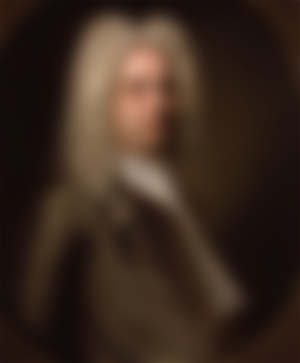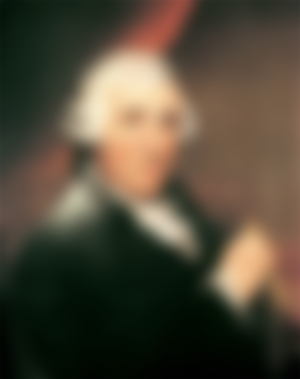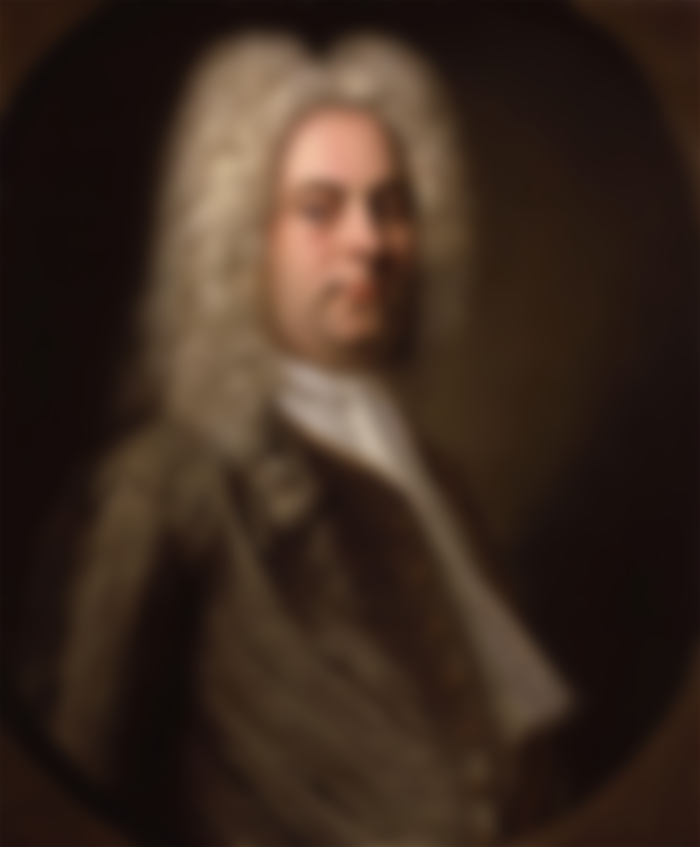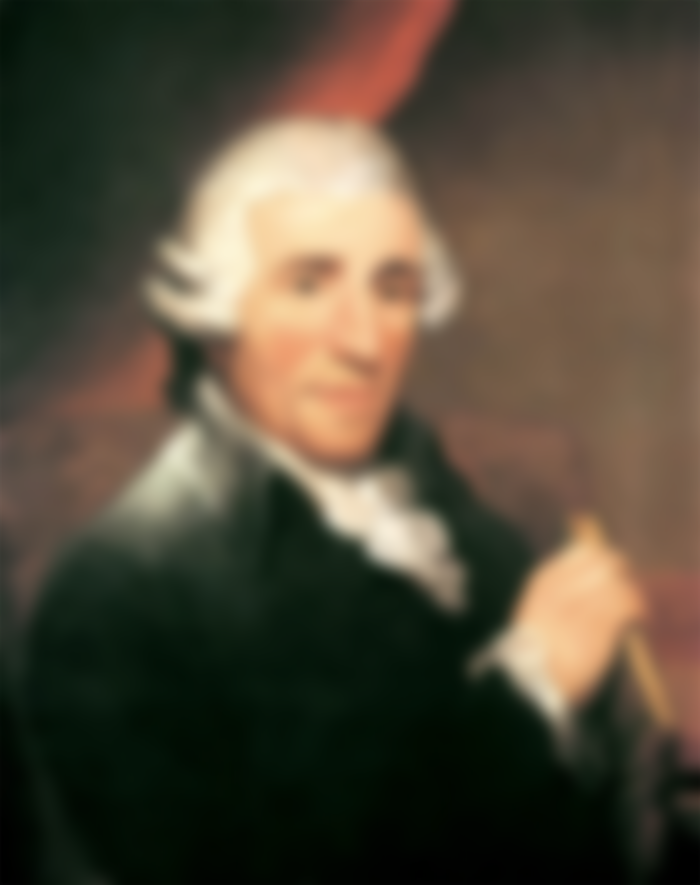Did time really stop a day? Yes, there is quite compelling evidence supporting such a view. But before we discuss that, let's begin with some music history. The common denominator is the oratorio.
(Originally published in April 2009, in connection with the anniversaries mentioned below, but has never before been published on the Internet.)
I. Handel & Haydn
Two great composers of the past were commemorated in April and May 2009. Handel died 250 years prior to that, on 14 April 1759, and Haydn 50 years later, on 31 May 1809. As usual that revived their music even beyond the usual interest.
George Frideric [Frederick] Handel (23 February 1685 – 14 April 1759) is, along with Bach, the great name of the Baroque. While Bach in style, temperament, and method was German through and through, Handel, on a German fundament, incorporated influences from outside, mainly Italy. The Italian-style Baroque opera became his first speciality, and with that he conquered the hearts of his English audience.

While employed by Georg, Prince-Elector (Kurfürst) of Hannover, Handel spent a lot of time in England, where he finally decided to stay - without first getting Georg's permission. In those times, that was certainly not an honourable and acceptable behaviour. Handel did not care, he had become the favourite of Queen Anne, and Georg was far away. But in 1714 Queen Anne died, childless. The English throne was inherited, guess by whom! - by Georg of Hannover, who became king George I. This was an embarrassing and precarious situation for Handel, but although the relationship between him and the king remained strained, he was allowed to stay in England.
Handel, who after 1751 became blind, was always struggling financially. It wasn't until 1750 that he could feel secure in that respect. He died in 1759 and is buried in Westminster Abbey.
Handel's production is enormous. The British Museum has 97 volumes of original manuscripts. It goes without saying that their quality varies. There are two genres, however, where he is the undisputed master. The first is the Italian-style Baroque opera; his operas are the pinnacle of that tradition. The other is the oratorio; a form he developed almost to perfection, with Messiah as the great masterpiece. Some other great oratories are: “Samson”, “Belshazzar”, “Judas Maccabaeus”, “Joseph”, “Joshua”, “Theodora”, “Solomon”, and “Jephtha”. This list is not exhaustive.
In 1708, Handel was in Rome, where the pope had forbidden operas. Oratorios, however, being religious, were allowed. Here Handel composed his first two works within this genre: "La resurrezione" and "Il trionfo del tempo", both basically operas masked as oratorios. It is not impossible that the opera-interested composer came to develop what would become his most important legacy, the oratorios, only because operas were illegal at that time and place.
[A note on my spelling of his name: Handel became a British subject in 1727, and he himself changed the spelling of his name. He was born as Georg Friedrich Händel, and this spelling is still used in some languages. Whatever language we use, however, I think his own choice takes precedence, and his name should be spelled as he did it himself: George Frideric Handel.]

Franz Joseph Haydn (31 March 1732 – 31 May 1809) was the first composer who managed to fill the until then superficial Viennese music with personality and emotion. His music was never revolutionary, but always evolutionary; seamlessly it ties the tradition preceding him with the one coming after. That does not mean he did not add something on the way. On the contrary, subsequent composers owe him a lot.
Just as Handel, Haydn visited England, and was very successful there. Unlike Handel, however, he did not stay.
Haydn, too, composed oratorios. "Die Schöpfung" (The Creation), and "Die Jahreszeiten" (The Seasons), but his most important contributions to European music were the symphonies and chamber music.
He did not invent the symphony, as is often claimed, but he shaped it to the classical form we still recognise, and which was later brought to completion by Beethoven. Of his own symphonies, the most interesting are the so-called London Symphonies, no. 93-104.
Haydn has been called the father of chamber music. This is not entirely correct, but just as with the symphony, he gave it the shape we still know. His string quartets have had an enormous impact on subsequent music. Of special interest are: Op.33 (The Russian), Op.50, Op.64, Op.74, Op.76, and Op.77.
Until 1918, the national anthem of Austria was Haydn's composition "Gott erhalte Franz den Kaiser". The theme is found in the second movement of the third quartet of Op.76. The anthem, with words of L. L. Haschka, was sung publicly for the first time on 12 February, in 1797.
If you are unfamiliar with classical music, but would want to explore it, and maybe like it, I suggest you begin with Haydn. He is old enough not to have become too complicated, yet modern enough not to feel alien.
II. Some Music Theory
To understand the origin and nature of the oratorio, it is necessary to approach the subject a bit technically.
First we must distinguish between two concepts: monody (homophony, monophony) and polyphony.
Monody, or homophony, is when one part predominates while the others are merely accompanying. In old Greece it denoted a single voice singing an ode in a tragedy.
Polyphony is when parts are individual; no part is predominant.
From about 800 AD, European music started to become polyphonic; and after a few centuries, more or less all church music was. Renaissance, however, with its idolising of Antiquity, brought monody into it again. In the beginning this was done in the form of a vocal or instrumental part, accompanied by thorough bass (figures indicating accompanying chords). One of the first to use monody in this way was Vincenzo Galilei, 1533 - 1591. (The famous physicist, Galileo Galilei, was his son.)
Polyphony further led to forms such as the fugue, and culminated with Bach, his "Kunst der Fuge" being the most pre-eminent example. Parts are equal in importance, a clear "melody" is indistinguishable, and the impression of the music is from its totality. (Writing as two or more independent parts is called counterpoint, which is the basis for polyphony.)
Monody, or homophony, on the other hand, triggered the development of the opera and the oratorio, and it came to dominate the eighteenth century after the Baroque, the nineteenth century, and popular music still today. A melody and accompaniment, that is how most people think of music. Within the so-called serious genre, however, the twentieth century brought music into new directions and homophony lost its dominance.
An oratorio is a dramatic composition, originally on a religious theme, for voices and orchestral accompaniment. Contrary to opera, it has no stage action; but the difference between these two has not always been razor-sharp. As a distinct form, it was not firmly established until Giacomo Carissimi (1605-1674) created the first oratorio in a classical sense.
As I have already mentioned, Handel came to be the great and unsurpassed master of this genre; Haydn composed two, only slightly inferior to Handel's; Mendelssohn and Liszt created adequate ones. In the twentieth century, Stravinsky and Honegger continued the tradition.
III. When Time Stopped
Writing about Handel, I was considering which of his many oratorios I should name. When I came to "Joshua", a detail in it struck me as an interesting topic here. It has nothing to do with Handel, not even with music, it just happens to be a part of the story and of history. But there is more to it than that!
Joshua, the leader of the Israelites after Moses' death, brought the people into Canaan, which was brutally conquered, and divided the country between the tribes. This is described in "The Book of Joshua", which follows immediately after the Pentateuch (The Five books of Moses) in the Old Testament.
Fighting an alliance of Amorite kings near Gibeon, there was a battle in a valley named Ajalon, conclusively won by the Israelites. The means were spectacular indeed. This is from Handel's “Joshua”, end of Act II:
"Joshua:
O thou bright orb, great ruler of the day,
Stop thy swift course, and over Gibeon stay!
And, O thou milder lamp of light, the moon,
Stand still, prolong thy beams in Ajalon.
Israelites:
Behold, the list'ning sun the voice obeys,
And in mid heav'n his rapid motion stays.
Before our arms the scatter'd nations fly,
Breathless they pant, they yield, they fall, they die."
The Book of Joshua, Chapter 10:12-14 expresses it thus:
"Then spake Joshua to the Lord in the day when the Lord delivered up the Amorites before the children of Israel, and he said in the sight of Israel, Sun, stand thou still upon Gibeon; and thou, Moon, in the valley of Ajalon.
And the sun stood still, and the moon stayed, until the people had avenged themselves upon their enemies. Is not this written in the book of Jasher? So the sun stood still in the midst of heaven, and hasted not to go down about a whole day.
And there was no day like that before it or after it [...]"
The sun stopped in the middle of the sky! Is this a real event or is it pure fiction? Unrealistic as it appears, it is easy to dismiss it as fictitious. Let us not fall into the trap, however, of judging by appearance and prejudice. If the sun really stopped in the sky, the event must have been spectacular enough to attract attention elsewhere; it should have been witnessed by others.
Yes, indeed, it was!
Aztec legends describe how time stopped and begun again. The day was frighteningly dark. It relates how the gods restored time, and made sun and moon moving again. It is possible that the pyramids of Teotihuacan were built as a result of this event, which took place long before the time of Aztec culture.
Fernando Montesinos, who came to Peru in 1628, tried to explore its history and prehistory, and he collected his results in "Memorias Antiguas Historiales del Peru". He relates an event taking place in the reign of Titu Yupanqui Pachacuti II, a ruler in pre-Incan times: "there was no dawn for twenty hours".
If we assume that the earth's rotation stopped for twenty hours, or a day, a prolonged day in Canaan would correspond to a prolonged night in Mexico and in the Andes (Peru). Independent testimonies corroborate that this was what happened.
Scientifically, the most likely explanation is the close passing of a comet, which could - at least in theory - disrupt the earth's spin.
By plausible reasoning, Zecharia Sitchin (The Lost Realms) concludes that this event took place in 1391 BC. Chronology is difficult and should always be taken with some scepticism - but on the present level of knowledge, I am inclined to believe he is right.
Copyright © 2009, 2018, 2021 Meleonymica/Mictorrani. All Rights Reserved.
Here you can find my articles about History.
Interested in history, legends and myths, join my community History, Myths, Legends & Mysteries (be45).
You find all my writings on Read.Cash, sorted by topic, here.

